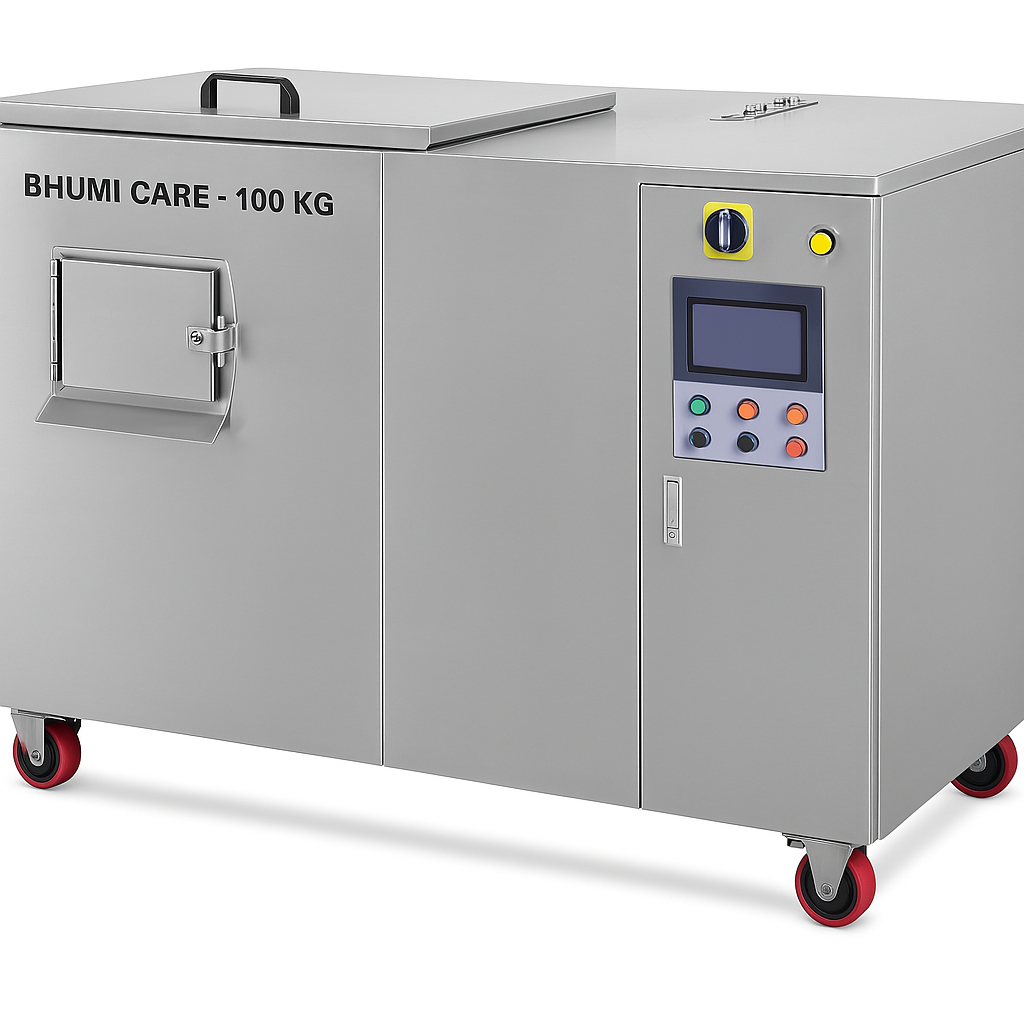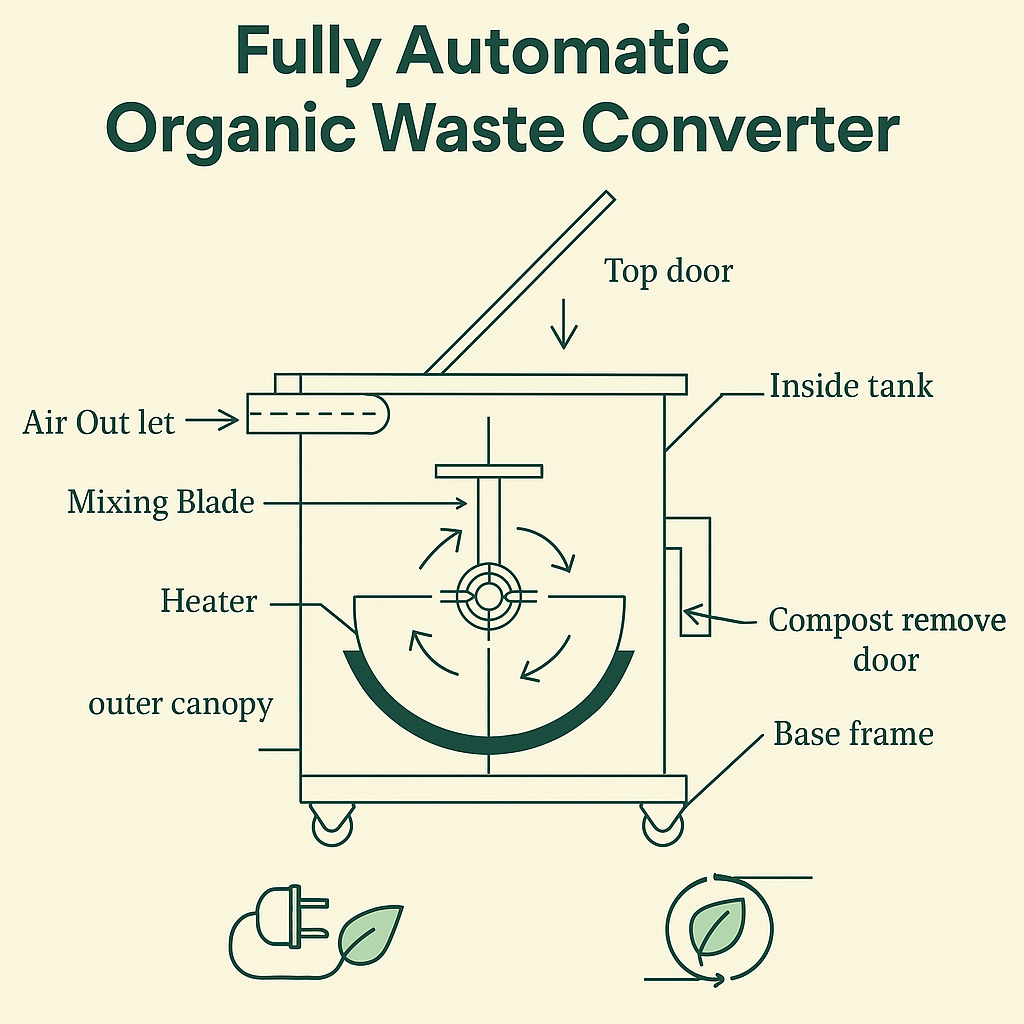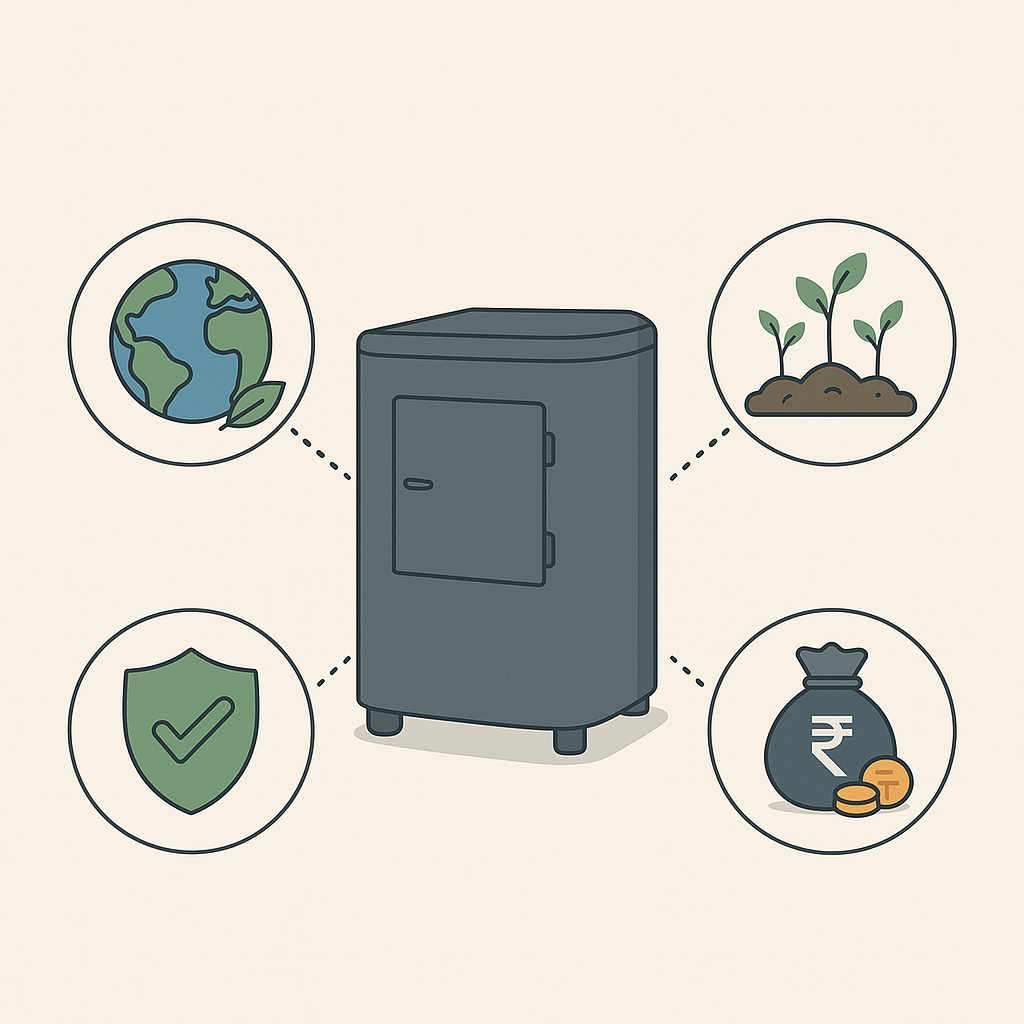At Bhumi Care, we offer a Fully Automatic Composting Machine, also referred to as the Organic Waste Converter (OWC). This innovative system is designed to transform how organic waste is handled.
Thanks to its cutting-edge automation, the machine simplifies the composting process. Moreover, its eco-friendly technology ensures minimal environmental impact. It effectively converts food waste, garden refuse, and other biodegradable materials into nutrient-rich compost. Additionally, the process is fast, clean, and requires very little manual intervention. As a result, users can enjoy a sustainable solution that supports both convenience and environmental stewardship.


Organic Waste Converters (OWCs) from Bhumi Care are designed to efficiently convert organic waste into high-quality compost using a fully automatic and eco-friendly process. Here’s how the system typically works in four simple stages:
Organic waste such as food scraps, garden waste, and biodegradable kitchen waste is collected and fed into the Bhumi Care OWC. The machine starts the process by shredding and evenly mixing the waste to create ideal conditions for composting.
Natural microorganisms (bacteria and fungi) are activated within the composting chamber. These microbes decompose organic matter efficiently under controlled conditions with optimal temperature, moisture, and aeration — all automatically managed by the system.
After initial decomposition, the semi-processed material undergoes a maturation phase. The machine maintains proper conditions to stabilize the compost and eliminate pathogens, enhancing the overall quality and structure of the compost.
Within 24–48 hours, the Bhumi Care OWC produces ready-to-use, nutrient-rich compost. This output is ideal for use as organic fertilizer, soil conditioner, or landscaping material — helping close the loop on sustainable waste management.
Implementing a Fully Automatic Organic Waste Converter (OWC) from Bhumi Care offers numerous environmental, economic, and operational advantages. Here’s why it’s a smart choice for sustainable waste management:

♻️ Converts organic waste into nutrient-rich compost
💸 Reduces waste disposal and transportation costs
🌍 Minimizes environmental pollution and landfill dependency
🌱 Supports sustainable agriculture and landscaping
🛠️ Fully automatic and easy to operate — low manpower required
🧼 Odor-free, noise-free, and pest-resistant operation
🕒 Quick composting process (within 24–48 hours)
📉 Reduces organic waste volume by up to 90%
💡 Low power consumption and compact design
⚙️ Complies with solid waste management norms and green building standards
🌐 Ideal for residential societies, hotels, hospitals, schools, offices, and industries
🌿 Promotes eco-friendly image and CSR initiatives
🔪 Inbuilt Cutting Blades
Efficiently shred organic waste for faster decomposition and smoother processing.
🛠️ Customized Product Options
Tailored to fit your space, capacity needs, and specific applications — ideal for housing societies, hotels, hospitals, and industries.
🧱 High-Grade Stainless Steel (S.S304) for Tank & Shaft
Built with corrosion-resistant, food-grade stainless steel for long-lasting durability and hygiene.
⚙️ Gearmotor with Direct Drive System
Ensures low maintenance, energy-efficient performance, and enhanced reliability without the need for belts or chains.
🧠 Intelligent Control System / HMI Interface
User-friendly Human-Machine Interface (HMI) for seamless operation, monitoring, and automation.
✅ Excellent Build Quality
Manufactured to the highest standards using premium components, ensuring long-term performance and customer satisfaction.
Discover how an Organic Waste Converter (OWC) transforms food waste, garden clippings, and other biodegradable materials into nutrient-rich compost—helping reduce landfill waste and support a greener planet. Perfect for residential complexes, hotels, industries, municipalities, and farms, this eco-friendly solution is simple, efficient, and sustainable.
Explore our FAQs to learn more about its benefits, working mechanism, cost, installation, and much more.
An Organic Waste Converter (OWC) is a system that processes organic waste like food scraps, garden waste, and biodegradable materials into compost or organic manure through microbial decomposition. It helps in waste management and sustainability.
The process includes:
OWCs are widely used in:
The cost depends on:
Regular maintenance includes:
Depending on the system and microbial activity, waste converts into compost within 24-48 hours in automated OWCs and 7-15 days in manual composting setups.
Yes, automated OWC systems require electricity for shredding, aeration, and microbial processing, but manual models operate without power.
With proper maintenance, an OWC system lasts 10-15 years, while microbial cultures require regular replenishment.
We follow a step-by-step process:







Contact us now if you need any information about our products, our team stands ready in understanding your needs!
9867407249
Vasai, Maharashtra, India
info@fluidtechequipments.com
9:00am - 6:00pm (Monday-Saturday)